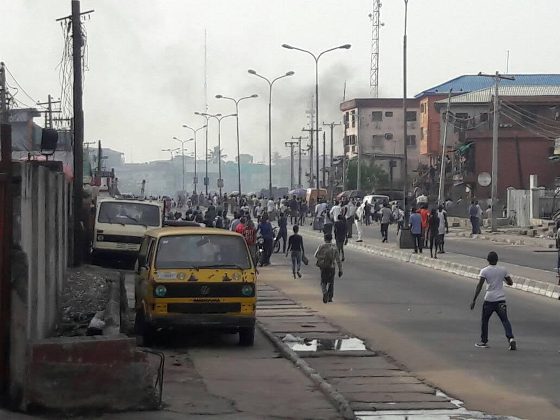Lagos, the bustling commercial capital of Nigeria, is a city of contrasts. Known for its vibrant energy, economic opportunities, and cultural diversity, it is also infamous for its challenges, including traffic congestion, crime, and infrastructure deficits. Among its many streets, a few stand out for their reputation as hotspots of danger, either due to high crime rates, hazardous conditions, or recurring violence. Eyes Of Lagos reports,
This article delves into one of Lagos’ deadliest streets, offering insights into the challenges faced by residents and what is being done to address them.
Mushin’s Akala Street: A Troubled Hotspot
Akala Street, located in the Mushin area of Lagos, has earned a notorious reputation over the years. Known for its criminal activities, the street is a haven for gang-related violence, drug trafficking, and other illicit activities. Despite periodic police raids and government interventions, Akala Street remains a symbol of urban decay and neglect.
1. Crime and Violence
The Mushin area, particularly Akala Street, has been plagued by gang wars between rival factions. These conflicts often escalate into violent clashes, leaving residents in a state of fear. Armed robberies and muggings are frequent occurrences, and the presence of illicit drug markets adds another layer of danger.
2. Poor Living Conditions
The living conditions on Akala Street exacerbate its challenges. Overcrowded housing, poor sanitation, and lack of basic amenities contribute to a cycle of poverty that fuels criminal activities. Residents often lack access to adequate healthcare, education, and employment opportunities, which perpetuates the area’s struggles.
3. Police and Security Challenges
While law enforcement agencies have made attempts to address the issues in Akala Street, their efforts have been met with limited success. Corruption, inadequate resources, and poor community-police relations hinder effective intervention. As a result, the street remains a flashpoint for crime and unrest.
Other Notable Dangerous Streets in Lagos
While Akala Street stands out, it is not alone in its notoriety. Other areas in Lagos have also gained infamy due to their high crime rates:
- Oshodi Underbridge: Known for petty theft, pickpocketing, and gang activities, particularly after dark.
- Ajegunle Streets: Nicknamed “Jungle City,” this area struggles with high rates of robbery and violence.
- Ijora Badia: This area is infamous for its slums and pockets of criminal activity.
- Ikorodu’s Cultist Streets: Cult-related violence and kidnappings have made certain streets in Ikorodu hazardous.
Efforts to Mitigate the Challenges
Authorities and non-governmental organizations (NGOs) have undertaken various initiatives to address the issues in dangerous areas like Akala Street. These include:
- Increased Policing: More frequent patrols and police visibility aim to deter crime.
- Community Engagement: Local leaders and community groups are working to foster better relations between residents and law enforcement.
- Urban Renewal Projects: Government initiatives to improve housing, sanitation, and infrastructure in high-risk areas.
- Youth Empowerment Programs: NGOs and state agencies are providing skills training and employment opportunities to reduce the allure of crime for young people.
Conclusion
Akala Street in Mushin epitomizes the challenges faced by some parts of Lagos, where urban poverty, crime, and neglect converge to create hazardous environments. While efforts are being made to address these issues, sustained investment in infrastructure, education, and social programs is essential to break the cycle of violence and poverty.
Lagos remains a city of hope and potential, but its deadliest streets remind us of the work that still needs to be done to ensure safety and prosperity for all its residents.




